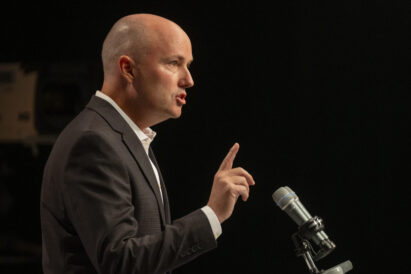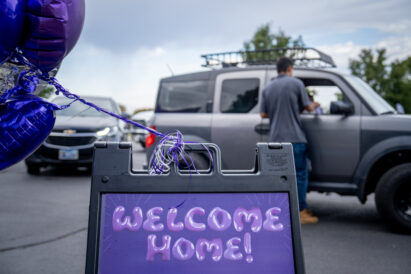Bill seeking ban on undocumented kids from Utah schools was released by accident, lawmaker says
Instead, Rep. Trevor Lee’s new proposed resolution urges the federal government to address illegal immigration

Photo supplied
Trevor LeeA proposed Utah House resolution to ask voters to amend the Utah Constitution to bar undocumented immigrant children from the state’s public schools was released by accident and should have never seen the light of day, according to the bill’s sponsor.
The original version of a proposed constitutional amendment would have asked voters to consider limiting Utah’s public education system only to children “who are citizens or legal residents of the United States.” That version quickly drew some controversy on social media after it was posted on the Utah Legislature’s website Thursday.
But Rep. Trevor Lee, R-Layton, quickly filed a substitute version of the resolution, released late Thursday, to address various other aspects of illegal immigration in the state, calling the first version “a rough draft” that was not ready to be made public.
“I didn’t decide to change it. It was supposed to have been what the actual substitution is now,” Lee said on Friday. “That was supposed to be the normal draft of the bill. It was put in wrong. After lots of discussion and talking with individuals, it was just made public before it was even close to being completed (and) the wrong version was put in there.”
The substitute resolution, which Lee said is the “right” version, “condemns the federal government for its failure to respond appropriately to the illegal immigration crisis,” among other points. It states that the Utah Legislature supports legal immigration, asks Congress to pass federal legislation on immigration and “urges the federal government to solve the problem of illegal immigration or allow states to solve problems caused by illegal immigration.”
The initial draft, Lee said, was “just one piece” of his proposed resolution, “but it’s nothing that we can solve or handle at the moment. So we’re calling (on the federal government) to fix the issue.”
The version of the resolution that was filed and made public “wasn’t supposed” to be filed, he said. “It was just research, data and information that we were looking at.”
However, the initial version of the constitutional amendment to restrict undocumented immigrant children from Utah’s schools is something Lee said he is studying. “We’ve already been studying it and we’re looking at it, but it’s not something that’s going to be proposed or happen anytime soon,” he said.
Lee said he’s “looking at how other states,” like Texas, that are searching for ways to handle illegal immigration “because the federal government is not.”
“That’s really the issue that’s at hand here,” he said. “Why is the federal government putting a problem on to our table and then saying, ‘You can’t do anything about it.’ That’s the real issue.”
Lee also cited the overturning of Roe v. Wade, ending the constitutional right to abortion, as an example of states taking the lead on policies.
“That’s all we’re asking with illegal immigration or what we’re hoping we’re going to get,” he said. “And with the Supreme Court more favorable to states rights versus the federal overreach, we’re confident that we could, at some point in the future, have a say in managing this problem because we do a much better job than the federal government at fixing solutions.”
The new version of the resolution claims that illegal immigration is costing Utah taxpayers $931 million a year, and that “an estimated 137,000 illegal aliens live in Utah, including roughly 48,000 children” and adds about 54,100 students to the public education system. For those estimates, Lee cited the Federation for American Immigration Reform, which is described in the Library of Congress as a nonprofit that advocates for changes in immigration policies “that they believe would result in significant reductions in immigration, both legal and illegal.”
Lee said he didn’t know what would happen to those children who would no longer qualify for public education if the constitutional amendment were to pass. “That’s a good question,” he said. “I don’t know. That’s why we’re not doing anything about it. That’s something we’d have to discuss if we were to do anything down the road.”
Legislative resolutions are non-binding and don’t enact requirements. Lee’s resolution would only send a message to the federal government that Utah lawmakers want them to do something about the country’s immigration crisis.
“Our country is going to turn into chaos if we don’t follow the rule of law and we stick to it and if you break it, you have to be punished for what you do,” Lee said.
Aden Batar, director of the migration and refugee services for Catholic Community Services of Utah, does agree with the notion that the immigration system in the country is broken and that Congress should take action.
But, forbidding children who may be escaping violence and searching safety in the U.S. is “inhumane,” he said.
“Children, it is not their fault that they’ve been here so we need to allow children to go to school and I think each state has that capacity to provide that,” Batar said, adding that the state should provide supports to families who are arriving because they may not have a place to go back to.
No legislature who cares about children would allow that, he said.
Utah News Dispatch is a nonprofit, nonpartisan news source covering government, policy and the issues most impacting the lives of Utahns.



